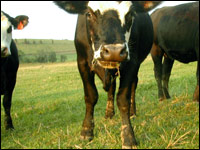Articles by Tom Philpott
Tom Philpott was previously Grist's food writer. He now writes for Mother Jones.
All Articles
-
Bush taps a GMO flack as his chief agricultural trade negotiator.
When Bush wants to kill a program or a department, he picks a clown to run it. Think of FEMA's disgraced "Brownie," who did such a "heck of a job" when disaster struck the Gulf Coast.
When the president sees something real at stake for his corporate clients, though, he tends to anoint an ultra-qualified pro: someone, typically, with direct ties to the industry in question. In surely the most spectacular example, Bush placed responsibility for creating energy policy in the crude-stained hands of Dick Cheney.
The world of agriculture presents its own examples. Over on Bitter Greens Journal last year, I documented how the president planted an industrial-corn man, with ties to corn-processing behemoth Archer-Daniels Midland, as deputy head of the U.S. Department of Agriculture.
Now I present you with Richard Crowder: erstwhile president of the American Seed Trade Association, a 15-year veteran of Dekalb Genetics Corporation (now part of Monsanto), former exec at Conagra and Pillsbury -- and newly minted chief agricultural negotiator for U.S. Trade Representative Rob Portman.
-
Cheers and jeers for the GM seed giant.
Two takes on Monsanto crossed my path yesterday. One came from the stock market, the other from Fedco, the small vegetable-seed purveyor that supplies many small, sustainable-minded farms across the land, including my own Maverick Farms.
The market applauded Monsanto Tuesday, driving its share price to an all-time high; Fedco, in its 2006 seed catalogue that arrived at Maverick the same day, gave it the finger.
-
Severe labor shortages in the southwest may add
A society that relies on cheap food also relies on cheap labor. Look at the meat-processing industry.
Worker conditions are so wretched, so little changed from Jungle days, that Human Rights Watch saw fit to issue a scathing report on the industry last January.
Because meat is perishable and prohibitively expensive to keep frozen over long journeys, meat processing cannot readily be sent overseas -- unlike, say, manufacturing. So the trick, as the Human Rights Watch report shows in wrenching detail, is to recreate working conditions prevalent in places like Guatemala, here.
Things are different in the large-scale fruit/vegetable business. Tomatoes, for example, can be picked green, shipped long distance with minimal refrigeration, and gas-ripened near the point of sale. Will vegetable farming move overseas?
-
Sustainable-ag legend Joel Salatin can farm — but can he write?
Over the past 20 years, Joel Salatin has emerged as a sort of guru of the sustainable-food movement. His 500-acre Polyface Farm in Swoope, Va., is legendary among a small circle of foodies for its robustly flavored beef, pork, chicken, and eggs. Among farmers, Salatin has won cult status for his innovations in multi-species, pasture-based […]
